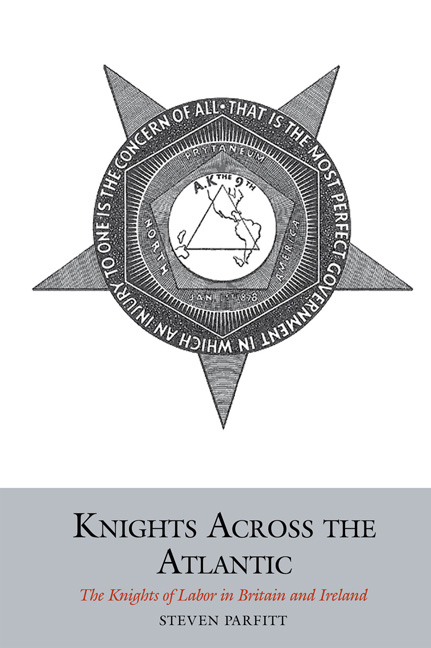Book contents
- Frontmatter
- Contents
- Acknowledgements
- Introduction: The World of the Knights of Labor
- 1 Origins
- 2 The Rise of a Transnational Movement
- 3 Organisation, Culture and Gender
- 4 The Knights in Industry
- 5 The Knights and Politics
- 6 The Knights and the Unions
- 7 The Fall of a Transnational Movement
- Conclusion: The Knights of Labor in Britain and Ireland
- Appendix: List of Known Assemblies of the Knights of Labor in England, Scotland, Wales and Ireland
- Bibliography
- Index
2 - The Rise of a Transnational Movement
- Frontmatter
- Contents
- Acknowledgements
- Introduction: The World of the Knights of Labor
- 1 Origins
- 2 The Rise of a Transnational Movement
- 3 Organisation, Culture and Gender
- 4 The Knights in Industry
- 5 The Knights and Politics
- 6 The Knights and the Unions
- 7 The Fall of a Transnational Movement
- Conclusion: The Knights of Labor in Britain and Ireland
- Appendix: List of Known Assemblies of the Knights of Labor in England, Scotland, Wales and Ireland
- Bibliography
- Index
Summary
On 5 May 1886, a crowded meeting of workers from various trades, from chain, anvil, tube, nut, bolt and vice makers to coal miners and ironworkers, met at the Boot and Slipper Inn in Smethwick, near Birmingham. The purpose of this meeting, as a newspaper report put it, was to consider ‘a system of federation for all trades societies, or the advisability of joining the Knights of Labour in America.’ The Reverend T.T. Sherlock opened with several introductory remarks. ‘The object of the movement was to secure for the labourer his full hire,’ he told the meeting. ‘It was not pillage and confiscation but simple justice that they wanted.’ The assembled workers began to applaud. As they did so two of the timber beams supporting the floor gave way with a crash. The applause was replaced by a surging mass of people who rushed the speaker's platform to escape from the collapsing scenery around them. No one, in the end, was injured or killed. The meeting reconvened in the open air, and Richard Juggins, one of the Black Country's most respected trade unionists, urged his listeners to ‘follow the action of the Knights of Labour in America.’ They did not, or they did so in their own way. Juggins led the creation of the Midland Counties Trades Federation, an association of small trades around Birmingham and the Black Country that features in later chapters.
This was an inauspicious event for a movement that expected, as Robert Layton put it, to establish itself in every town and city in Britain within a matter of years. Yet it was hardly fatal. Knights had established LA2886 at Cardiff in 1883, LA3504 in 1884, and in the following year an assembly of dock labourers at Liverpool, which included the future Labour MP James Sexton, began, grew and then launched a disastrous, failed strike that brought the assembly to an end. In 1886, Robert Robertson and Charles Bird, two organisers with LA3504's Spon Lane preceptory, began to proselytise for the Order among local workers outside the glass trade. They were, ironically enough, initially constrained by a circular sent from the Order's General Secretary, which ordered all organisers to cease opening new assemblies for a period of 40 days.
- Type
- Chapter
- Information
- Knights Across the AtlanticThe Knights of Labor in Britain and Ireland, pp. 50 - 78Publisher: Liverpool University PressPrint publication year: 2016



